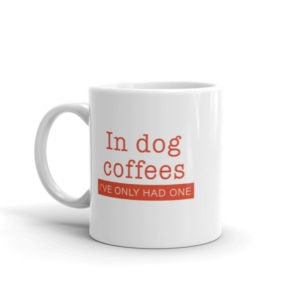This post may contain ads and affiliate links and we may earn a small commission when you click on the links at no additional cost to you. As an Amazon Affiliate, we earn from qualifying purchases. You can read our full disclaimer here.
Golden Retriever Growling: Decoding and Responding to Your Dog
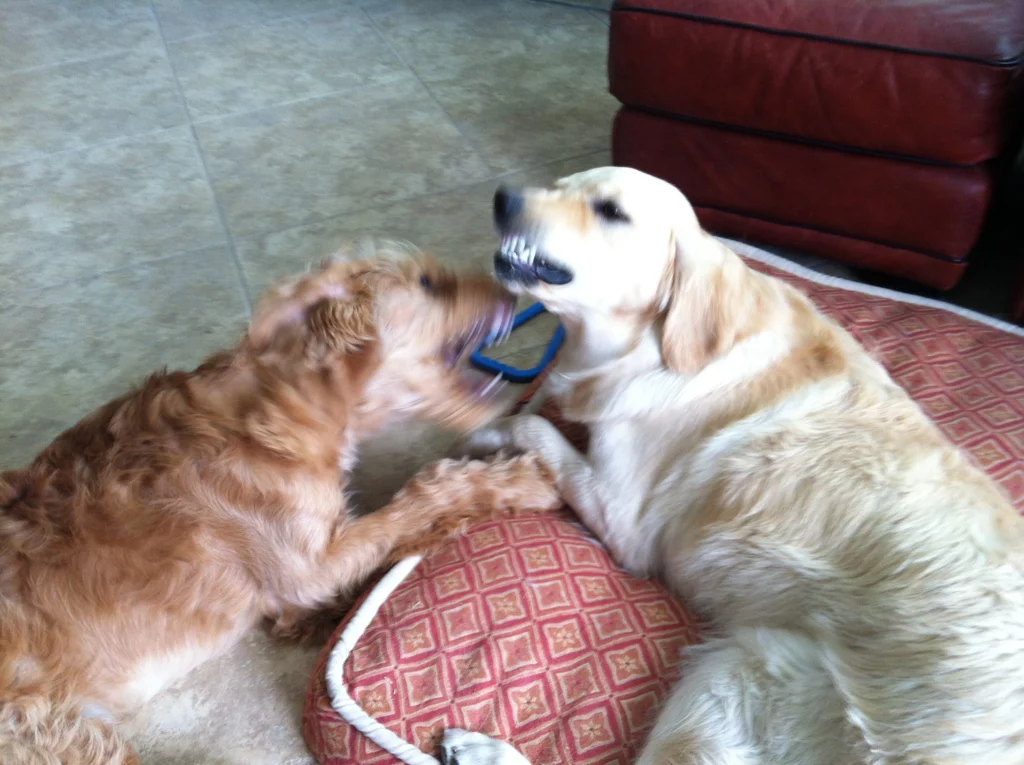
If you’ve ever heard your Golden Retriever growling, you might have found yourself a tad puzzled or even worried. But fear not! Growling is a normal part of your furry friend’s language.
The Importance of Decoding Your Golden Retriever Growling
Grasping its meaning is crucial for both seasoned Golden Retriever owners and prospective ones. It’s a valuable tool in building a strong and healthy relationship with your dog.
What’s in This Guide?
In this comprehensive guide, we’ll delve into the riveting realm of dog communication, with a spotlight on our charismatic Golden Retrievers.
We’re set to uncover the multitude of reasons that might lead to your Golden Retriever growling, ranging from joyful play to signs of unease.
Along this journey, we’ll provide the keys to decode different growls and shed light on how to respond appropriately when your Golden voices their feelings.
Science Meets Golden Retriever Growling
Moreover, we’re going to take a backstage tour into the science of growling, introducing you to some compelling studies on canine communication.
You’ll be better prepared to discern if your Golden’s growl is merely playful chit-chat or a warning signal demanding your attention.
Understanding Why Golden Retrievers Growl
Dog Communication 101: The Role of Golden Retriever Growling
Growling is more than just a guttural rumble from your furry friend. It’s a fundamental form of canine communication.
It’s a way for your Golden Retriever to express a variety of emotions and intentions.
Like a sentence in a language, each growl carries a message, and your role as a pet owner is to learn this unique language.
Let’s look at some of the most common reasons your Golden Retriever might be growling. Remember, context is key. The situation, body language, and even the pitch of the growl can provide hints about what your pet is trying to say.
1. Fear or Anxiety
Golden Retrievers, despite their generally affable nature, can feel threatened or anxious. In such instances, you might hear a low, intense growl. This is your Golden’s way of saying, “I’m scared, and I need space.”
2. Discomfort or Pain
Just as humans might groan when in discomfort, dogs often express physical pain or discomfort through growling. If your pup growls when touched in a specific area, it might be a sign of physical distress.
Always pay close attention to such growls; they might warrant a vet visit.
3. Playfulness
Ever heard a playful, rumbly growl during a game of tug-of-war? That’s your Golden Retriever having a good time!
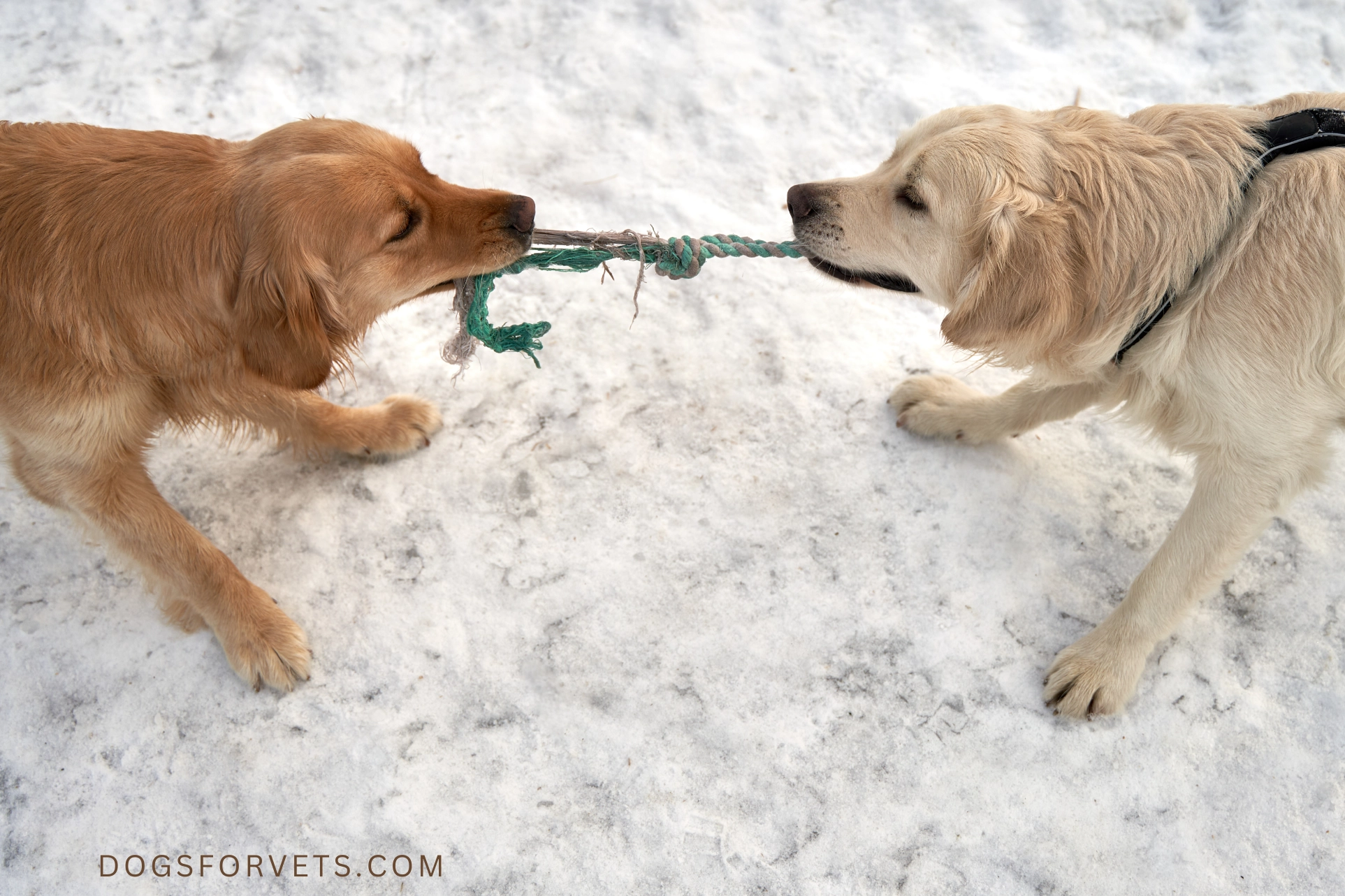
These growls are usually less intense and are accompanied by relaxed body language and wagging tails.
4. Protectiveness
Golden Retrievers are loyal dogs, often protective of their territory and their humans. If a stranger or another animal encroaches on what your Golden considers their domain, you might hear a growl of warning.
5. Possessiveness
This is common when your pet has a favorite toy or a delicious treat. If they growl when someone approaches their cherished possession, it’s their way of saying, “This is mine!”
Each growl tells a story, and understanding these can go a long way in developing a stronger relationship with your Golden Retriever.
Decoding Golden Retriever Growling: Learn the Language
Deciphering your Golden Retriever’s growls is akin to learning a new language. Don’t be daunted – with a little practice, patience, and attention to detail, you’ll soon become fluent.
Let’s familiarize ourselves with some common types of growls and what they could mean.
Playful Growl
- Sound: Low, rumbly, and full of good vibes.
- When It Might Occur: Often heard during games, like fetch or tug-of-war.
- Body Language: Expect an enthusiastic wagging tail and overall relaxed posture.
- What It Means: This growl translates to “I’m having a blast!”
Warning Growl
- Sound: Deep, intense, and serious.
- When It Might Occur: Could arise if your Golden feels threatened or anxious, or if someone unknown encroaches on their space.
- Body Language: Look out for rigid body language, a tense facial expression, or hair standing up on their back.
- What It Means: It’s your Golden’s way of saying, “You’re in my comfort zone. Please back off.”
Pain Growl
- Sound: A low, continuous sound that can be quite alarming.
- When It Might Occur: You might hear this when you touch a sensitive spot or if your pet moves in a way that causes discomfort.
- Body Language: Unusual stiffness, limping, or avoiding touch could accompany a pain growl.
- What It Means: “I’m in pain. I need help.” If you suspect your pet is in pain, it’s essential to seek veterinary advice immediately.
Possessive Growl
- Sound: Can range from a low, grumbly growl to a surprisingly fierce one.
- When It Might Occur: If someone or another pet gets too close to a treasured toy, food, or even their favorite human.
- Body Language: The ears might prick up, the body may stiffen, and they may stand over the item or person protectively.
- What It Means: It’s their way of saying, “This is mine. Please respect my space.”
Remember, these are general pointers. Each Golden Retriever is an individual with their own personality and way of expressing themselves.
Spending quality time with your pet, observing, and learning from their unique communication style is key.
With this knowledge in hand, you’ll be able to navigate your Golden’s world with greater understanding and empathy.
What to Do When Your Golden Retriever Growls
Knowing how to react when your Golden Retriever growls is crucial for maintaining a safe and happy environment.
Here are some strategies that can help you navigate these growling moments, promoting good behavior and strengthening your bond with your furry friend.
- Respect Their Space
- When: If your Golden Retriever emits a warning growl.
- What to Do: Give them some space and allow them to calm down. Never punish a dog for growling in fear or discomfort, as this can lead to more aggressive behavior.
- Check for Discomfort
- When: If your pet growls when touched in a specific area or during certain movements.
- What to Do: It’s essential to get them checked by a vet. Pain-induced growling should never be ignored.
- Maintain a Positive Atmosphere During Play
- When: If your Golden growls during playtime.
- What to Do: This is generally fine, as long as the play remains friendly and non-aggressive. Always monitor to ensure playtime doesn’t escalate into something more intense.
- Use Positive Reinforcement Training
- When: If your dog growls due to possessiveness.
- What to Do: Training can help mitigate possessive behavior. Start by teaching the ‘leave it’ or ‘drop it’ command using treats. Always reward good behavior. If the behavior persists, consider seeking help from a professional dog trainer.
- Consult a Professional
- When: If your Golden Retriever exhibits consistent aggressive growling or if their behavior changes suddenly.
- What to Do: It’s important to reach out to a professional. Consistent aggressive growling can indicate deeper behavioral issues that may require a professional’s guidance.
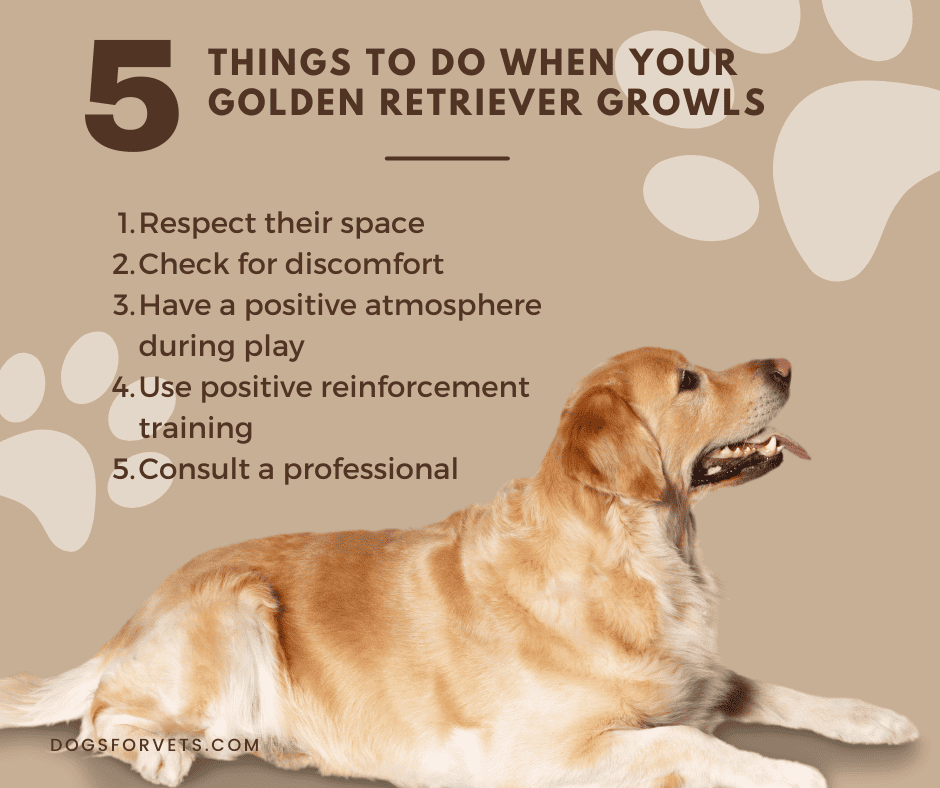
Remember, patience and understanding are key when dealing with growling. Never punish a growl; it’s an important communication tool for your dog.
Instead, focus on understanding the root cause and addressing it appropriately to foster a strong, loving relationship with your Golden Retriever.
The Science Behind a Golden Retriever Growling
Growling isn’t just an arbitrary noise; it’s a complex form of communication deeply rooted in a dog’s biological and psychological makeup.
Let’s explore the scientific underpinnings of growling and the intriguing research findings in canine communication.
Biological Basis of Growling
Growling, like other vocalizations in animals, arises from a combination of physical and neurological processes. The larynx, often referred to as the voice box, is the key player in producing the sounds we hear as growls.
When a dog growls, the muscles of the larynx contract in specific ways, modulating the flow of air from the lungs and producing different types and pitches of growls.
The brain plays a crucial role in coordinating these actions and interpreting situations that warrant a growl.
Different parts of the brain are responsible for the perception of threat, fear, pain, and joy, triggering the appropriate vocal response.
Psychological Aspects and Research Findings
Psychologically, growling serves as an essential tool for social communication among dogs. It helps maintain social hierarchies, express emotions, and convey intentions.
Dogs are highly social creatures, and their communication skills have been honed over thousands of years of evolution.
Recent research has shed light on the intricate nature of dog growls. For instance, a study published in the journal “Royal Society Open Science” in 2017 demonstrated that dogs could discriminate between playful and aggressive growls heard in different contexts.
This finding indicates a high degree of sophistication in canine vocal communication.
Furthermore, research has found that humans, too, can often interpret the emotional content of dog growls.
A study published in “Animal Cognition” in 2018 found that people could accurately categorize different dog growls, such as play-fighting, threatening, and fearful growls, showcasing the interspecies communication potential.
The exploration of the science behind Golden Retriever growls underscores the complexity of their communication skills.
As we continue to study and understand this fascinating field, we enhance our ability to communicate with and understand our loyal companions better.
Golden Retriever Growling: Warning Sign or Playful Banter?
Determining whether a growl is a playful jest or a serious warning can sometimes be tricky, but understanding the context and watching for accompanying body language can provide valuable clues.
Let’s delve into some guidelines for distinguishing between different types of growls and identifying potential warning signs.
Evaluate the Context:
Context plays a massive role in decoding a growl. If your Golden Retriever is growling while playing tug-of-war, it’s likely a playful banter.
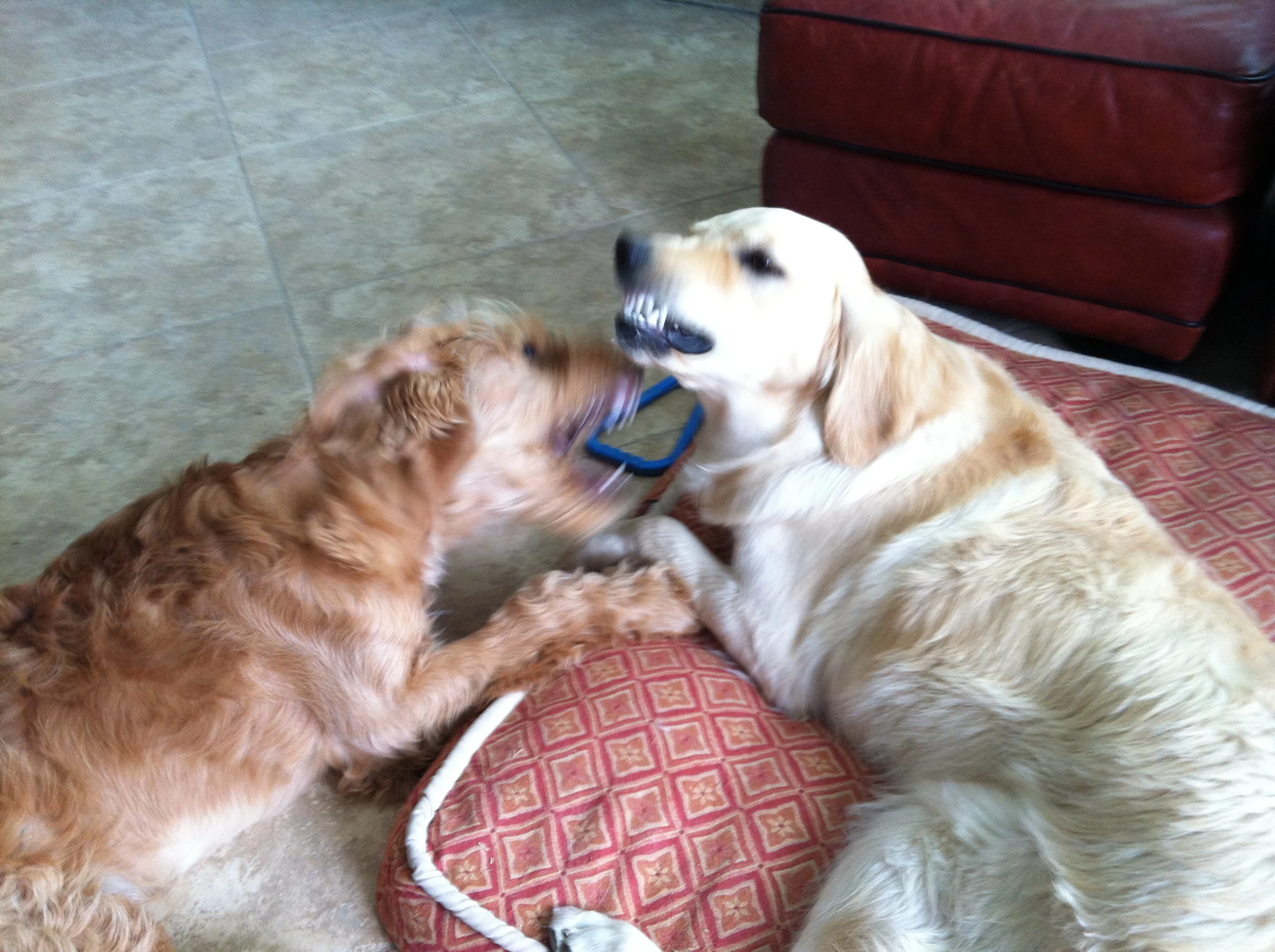
However, if the growling happens when a stranger approaches, it might be a warning sign. Understanding the circumstances can help determine the meaning of the growl.
Watch the Body Language:
Body language can reveal a lot about a growl’s nature. If your Golden’s body is relaxed, and the tail is wagging during a growl, it’s likely playful.
Conversely, if their body is stiff, ears are pinned back, or teeth are showing, the growl may be a warning sign.
Listen to the Sound:
The sound of the growl itself can give clues. High-pitched, light growls are often playful, while deep, low growls can indicate a warning or threat.
However, always consider this in conjunction with context and body language for accurate interpretation.
Note the Duration and Intensity:
A long, drawn-out growl might indicate fear or discomfort, whereas short, intermittent growls could be playful.
Similarly, the intensity can vary; a fierce, loud growl might be a warning, while a softer, less intense one might indicate playfulness or slight discomfort.
Observe Behavior Changes:
If your Golden Retriever’s growling behavior changes suddenly or increases without apparent reason, it could be a warning sign of underlying issues, such as health problems or increased anxiety.
It’s always a good idea to consult a professional if you notice significant behavior changes.
Remember, these are general guidelines, and individual dogs may vary. Understanding your Golden Retriever’s unique communication style is key.
Your pup’s growl is their way of ‘talking’ to you. Whether it’s a warning sign or playful banter, responding appropriately strengthens your bond and ensures a happy, healthy relationship.
Final Thoughts on Golden Retriever Growling
Mastering the language of your Golden Retriever’s growls can enrich your bond with them and ensure their well-being.
Whether it’s deciphering the reasons behind their growls, knowing how to respond, or distinguishing between warning signs and playful banter, these insights can greatly enhance your communication with your furry friend.
Remember, each Golden Retriever is unique, so observation and patience are key. Apply these learnings in your interactions and take your understanding of your Golden Retriever to a new level.
Now, it’s time to tune in closer to your Golden’s growls and embrace this wonderful aspect of your shared communication.

